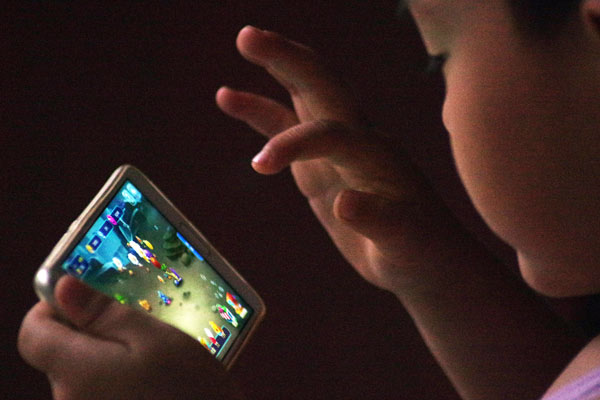Children’s ban can help curb fears over internet addiction
|
|
|
A child plays a mobile game in Dezhou, Shandong Province. [Photo provided to China Daily] |
Gaming addiction has become a serious concern for young players and has forced Tencent Holdings Ltd to act.
Children under the age of 12 will only be allowed to play its mega-hit, Honor of Kings, for just one hour each day. They will also be banned from logging on after 9 p.m.
Juveniles between the ages of 12 to 18 will only have access for two hours in a trial program rolled out by Tencent to combat online dependence.
Underage players who exceed their time allowance will automatically be logged off.
“Addiction to anything will bring in problems. We have to do something to prevent teenagers indulging themselves in the game. To protect children is to protect the game,” said Li Min, developer of Honor of Kings.
To enforce the ban, the company will tighten up its realname registration system to prevent young players faking identities.
Back in February, Tencent rolled out a “protection platform” to help parents supervise their children’s game accounts.
Since then, the company has updated the program and connected it to 700,000 accounts, covering 200 games, including Honor of Kings.
Still, Tencent’s decision to bring in tighter controls came after the People’s Daily criticized the game’s negative impact on underage players earlier this week. The newspaper also called on the company to make greater efforts to solve this problem.
The market responded instantly. Tencent’s share price dropped 4.13 percent on Tuesday on the Hang Seng Index in Hong Kong.
It was the online company’s largest one-day loss this year, paring HK$109.9 billion ($14 billion) off its market value.
But Zhang Shule, a senior independent game industry analyst, felt there was no reason for investors to panic.
Claims that these games can be addictive were leveled at Legend in 2004 and World of Warcraft in 2009, he claimed. History, he pointed out, just repeats itself.
“Condemnation is not a solution,” Zhang said. “The teenagers who were obsessed with World of Warcraft 10 years ago have not turned out to be a beaten generation.
“Management supervision is indispensable, but it’s unnecessary to focus too much on one simple case,” he added. “Instead, we should come out with some healthy products that can attract children’s attention.”
Up to 70 percent of the players on Honor of Kings are office workers, with another 25 percent university students, statistics released by mobile data-service platform TalkingData in Beijing showed.
Juvenile players make up only 3 percent of total users.
Yet Pony Ma, founder of Tencent, has made it clear that the company has a duty to prevent children from getting addicted to the internet.
“Children who are overly obsessed with the internet usually struggle to communicate with their parents,” Ma said.
“This ends up leading them to the virtual world … and turning away from society,” he added.
